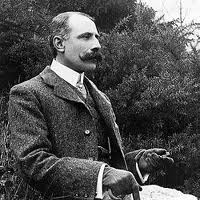Pomp & Circumstance No.1
Buy this item (in stock)
Product ID: WG3 TM1583
By Edward Elgar
Publisher:
Musikverlag Andrea Wiegand
Series:
Festive Music
Line Up:
Flex
Duration:
5'00
Level: 2-3
Set & Score
This item is in stock
About this item
Of the five military marches which Elgar put together, the first is undoubtedly also Number One in the hearts of performers and listeners. There is scarcely a comparable march which can achieve in a positive way such a "pompous" and festive atmosphere using a relatively simple, but eminently retainable melody. Thus the immense popularity of Pomp and Circumstance should come as no surprise.
This new arrangement for student and amateur orchestras includes far more than the especially famous Trio – the introductory Fanfare can be played (if desired), so that the march with all its important movements can be completely presented.
A special feature of our new arrangement is that it can be played alone by strings or winds, or also together by both groups of instruments. Passages that are dropped during the joint presentation are indicated by smaller notes. The viola can be replaced by a 3rd violin – score obtainable at no charge. The winds require 2 flutes, 2 clarinets, 2 trumpets (or 2 additional clarinets), French horn or alto saxophone – part can be downloaded, and bassoon or trombone. In addition, one or more harps are needed but can be replaced by guitars, as well as a timpani. A piano score is helpful for learning the piece and for providing accompaniment.
The arrangement for the Trio is simple; the rest is of moderate difficulty. Learning Pomp and Circumstance always pays off; no one can resist the overwhelming effect of this music – neither musicians nor members of the audience.
Reviews and rating
No review available, be the first to write one!

Composer
Edward Elgar (1857-1934)

Sir Edward William Elgar, 1st Baronet OM, GCVO (2 June 1857 – 23 February 1934) was an English composer, many of whose works have entered the British and international classical concert repertoire. Among his best-known compositions are orchestral works including the Enigma Variations, the Pomp and Circumstance Marches, concertos for violin and cello, and two symphonies. He also composed choral works, including The Dream of Gerontius, chamber music and songs. He was appointed Master of the King's Musick in 1924.
Although Elgar is often regarded as a typically English composer, most of his musical influences were not from England but from continental Europe. He felt himself to be an outsider, not only musically, but socially. In musical circles dominated by academics, he was a self-taught composer; in Protestant Britain, his Roman Catholicism was regarded with suspicion in some quarters; and in the class-conscious society of Victorian and Edwardian Britain, he was acutely sensitive about his humble origins even after he achieved recognition. He nevertheless married the daughter of a senior British army officer. She inspired him both musically and socially, but he struggled to achieve success until his forties, when after a series of moderately successful works his Enigma Variations (1899) became immediately popular in Britain and overseas. He followed the Variations with a choral work, The Dream of Gerontius (1900), based on a Roman Catholic text that caused some disquiet in the Anglican establishment in Britain, but it became, and has remained, a core repertory work in Britain and elsewhere. His later full-length religious choral works were well received but have not entered the regular repertory. The first of his Pomp and Circumstance Marches (1901) is well known in the English-speaking world.
In his fifties, Elgar composed a symphony and a violin concerto that were immensely successful. His second symphony and his cello concerto did not gain immediate public popularity and took many years to achieve a regular place in the concert repertory of British orchestras. Elgar's music came, in his later years, to be seen as appealing chiefly to British audiences. His stock remained low for a generation after his death. It began to revive significantly in the 1960s, helped by new recordings of his works. Some of his works have, in recent years, been taken up again internationally, but the music remains more played in Britain than elsewhere.
Elgar has been described as the first composer to take the gramophone seriously. Between 1914 and 1925, he conducted a series of recordings of his works. The introduction of the microphone in 1925 made far more accurate sound reproduction possible, and Elgar made new recordings of most of his major orchestral works and excerpts from The Dream of Gerontius. These recordings were reissued on LP record in the 1970s and on CD in the 1990s.
More info about the composer...



 Click above to view samples
Click above to view samples
